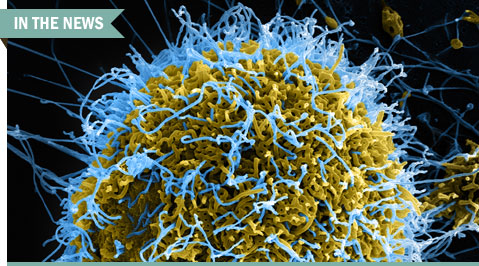
As the Ebola epidemic in West Africa deepens, U.S. healthcare organizations are working to have appropriate procedures and systems in place to handle suspected or confirmed cases of this highly infectious disease that cross American shores. To support the clinical laboratory community in this effort, AACC has developed a special Ebola resources webpage. AACC also has created an Ebola-specific listserv, for AACC members to collaborate with each other about their strategies for and practical experiences dealing with suspected or actual Ebola-related laboratory testing, and is sponsoring a second Ebola-related webinar.
“When the Ebola-infected healthcare workers were brought to Emory University Hospital in Atlanta for treatment, many of our members were asked by their respective institutions to prepare their labs to receive Ebola samples. With these requests came many questions and concerns from our members,” recalled Gary Myers, PhD, AACC’s vice president of science and practice affairs. “To be responsive to our members’ needs, we developed an Ebola response plan that includes the Ebola webpage listing various guidance materials for the safe handling of suspected Ebola samples, a specific listserv for members to pose Ebola-related questions, and other educational programs. We hope these resources will serve to add clarity and provide the tools needed so our members can make informed and proper decisions.”
The AACC Ebola resources webpage includes links to eight Ebola- or biohazard-related guidance documents, ranging from the Centers for Disease Control and Prevention’s (CDC’s) interim guidance on specimen collection, transport, testing, and submission, to the Australian Department of Health’s laboratory procedures and precautions for samples collected from patients with suspected viral hemorrhagic fevers.
In addition, the page links to Ebola resource pages of other medical associations, including the American College of Emergency Physicians and the Association for Professionals in Infection Control and Epidemiology.
AACC created the Ebola-specific listserv as a focal point for members’ questions and comments about handling and processing suspected Ebola samples. Previously, members’ questions had appeared on other AACC divisional listservs.
AACC also plans to hold a free Ebola-related webinar at 2 p.m. EST on November 13, supported by Sysmex. "Lessons From the Front Line: Labs Share Experiences Testing Ebola Patients" will feature Drs. James Ritchie and Karen Frank of Emory University and the National Institutes of Health, respectively. In this hour-long session, Ritchie and Frank intend to discuss how their labs prepared to test Ebola patients, what they learned while testing the patients in their care, and what they would do differently in the future.
As CLN Stat previously reported, AACC on October 7 held a webinar on dealing with Ebola and other emerging infectious agents, which is still available for purchase. During the webinar, Nancy E. Cornish, MD, medical officer with CDC’s Division of Laboratory Science and Standards, and Sheldon Campbell, MD, PhD, director of laboratories at VA Connecticut Health System, fielded questions from participants on subjects such as processing suspected or confirmed Ebola specimens via point-of-care testing or in core labs. They also pointed out that Ebola patients often test positive for other viral pathogens.
Just before the webinar, AACC developed a survey on Ebola-related laboratory testing practices, which remained open until October 17.
An article in the December issue of CLN will look at current lab testing guidance and report on Emory University Hospital’s actual experiences dealing with Ebola.
AACC will continue to monitor Ebola-related developments and update its program offerings and resource page accordingly.